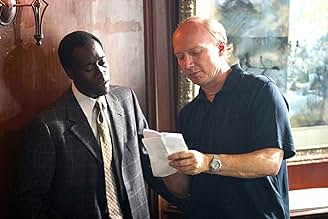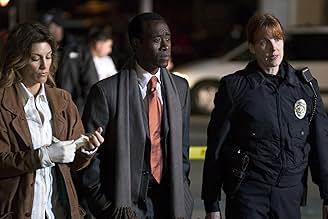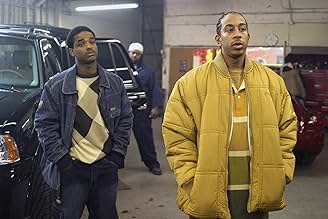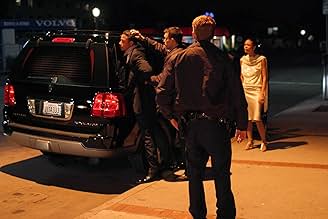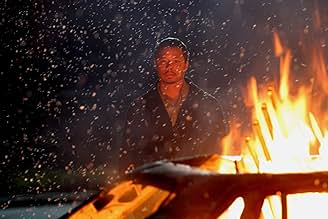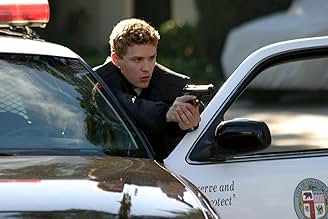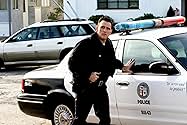Racial tensions collide in a collection of intertwined stories involving residents of Los Angeles.Racial tensions collide in a collection of intertwined stories involving residents of Los Angeles.Racial tensions collide in a collection of intertwined stories involving residents of Los Angeles.
- Won 3 Oscars
- 66 wins & 112 nominations total
Thandiwe Newton
- Christine
- (as Thandie Newton)
Sean Cory
- Motorcycle Cop
- (as Sean Cory Cooper)
Eddie J. Fernandez
- Officer Gomez
- (as Eddie Fernandez)
- Director
- Writers
- All cast & crew
- Production, box office & more at IMDbPro
7.7459.4K
1
2
3
4
5
6
7
8
9
10
Featured reviews
overrated piece of trash
I do not want to do an in-depth analysis of this film. Rather, I'll point out what I consider makes it a very poor effort: the script. The same guy who did the script for CRASH also did the script for MILLION DOLLAR BABY. Both won the Oscar for best picture. I must be pretty out of touch to criticize this guy, but here goes. The main problem is that every character is "invented". That is, each character is so obviously the product of a fertile (and I am using that word kindly) imagination. In CRASH the politician and his wife are absolute stereotypes. They speak the most inane lines, like from a comic book or low-grade soap opera. The two cops are similarly contrived. One is a good guy and one is a bad guy. One is an idealist. One is a cynical veteran. I imagine such categories of cops do exist, but to give them life it takes someone who knows the genres, like Joseph Wambaugh. (In fact, to see how really bad CRASH is, just compare it to THE ONION FIELD). We also have the two foul-mouthed gang-banging black youth, hell bent on insanity. Big deal. Anyone can produce such characters. There is the misunderstood, good-guy Mexican plumber, who just happens to love his young daughter oh so much. Etc. Etc. Each character has the depth of a comic-book creation. They all speak in litanies of clichés. The plot too is just a clever manage of intersections. It is so obviously the product of the next cup of coffee or cigarette. It is cleverness without depth or substance. Christ, that this film won best picture just begs belief.
While I am getting in my two cents here, MILLION DOLLAR BABY is the same cliché-riddled mess. It is obvious that the guy who wrote knew nothing about boxing. The characters are pathetic, lifeless creations.
What has Hollywood come to that such movies walk away with top prize?
While I am getting in my two cents here, MILLION DOLLAR BABY is the same cliché-riddled mess. It is obvious that the guy who wrote knew nothing about boxing. The characters are pathetic, lifeless creations.
What has Hollywood come to that such movies walk away with top prize?
The #2 Feel Bad Movie of the 2000s
"Crash" is a superbly made film. The actors are first rate, the camera style is engaging, and production value is tops. And despite all this, I would never recommend it to anyone. Why? I'll explain in my 4th paragraph but first let's talk about the story.
This film follows the lives of a dozen or so people over the course of 2 days all living in Los Angeles. The opening scene gives us the aftermath of some ambiguous tragedy (the titular "crash"), and the next scene flashes back to "yesterday" and shows us the events in these people's seemingly unrelated lives, leading up to that opening moment. If you've seen "House of Sand and Fog" (the #1 Feel Bad Movie of the 2000s), you'll recognize an identical sort of chronology and foreboding tone--so similar that I wonder if the Crash filmmakers were somehow involved in House as well. Both films are very powerful and effective at what they aim to do, and that is, simply put, to disturb us.
Disturb us it does. Within the first 15 minutes, we see things that are so disturbing to the pit of our souls that I almost shut the movie off twice. Racism, hate, justified racism, justified hate, brutal stereotypes. The film masterfully shows us not only the worst quality of humankind but it scrutinizes the reasons why humans are this way. There's no good guy/bad guy; it's all bad guys. The first 15 mins is designed to make us hate almost every character, if not every race. By showing the atrocity that each race supposedly inflicts on the other, it paints us a Hatfield-McCoy cycle of hatred that has no known origin. It just exists and burns hotter. Non-whites are subverted by white society, so they exact revenge by committing crimes against white people which in turn causes the white police to hate and abuse non-white people who in turn become criminals against white people. The cycle of hate is not only explained but validated in a well-crafted, brutally told, highly disturbing way.
Which leads me to the 4th paragraph where I explain why I would never recommend this film. It's because IT JUST MAKES YOU FEEL BAD. For nearly 2 hours you get the same feeling you get when you watch too much cable news. And just as psychologists warn that watching too much news leads to depression, I would say the same can be said of films like this which, like the news, expose and scrutinize the absolute worst of humanity.
But then one might say that films like this are necessary to inspire change. Normally I would agree, and I'm sure that that's the intent of the filmmakers here. But let me ask you: who needs to change? Answer: racists and bigots. But are racists and bigots really going to be watching "Crash", stroking their beards and saying "Golly, I need to stop being a racist"? Probably not. And that is the film's undoing. By taking a heavy, ponderous, complex look at racism and hate, it alienates the fury-driven haters who most need to grasp this message. And instead "Crash" merely preaches to the choir, making the choir feel gawd awful lousy about the state of the world.
The film attempts to lead us to redemption, and there is at least 1 truly powerful scene of triumph that's worth the price of admission. However, other subplot resolutions seem a bit contrived, if not completely unnecessary, such as one character's climactic tragedy & epiphany which was so random I literally burst out laughing (the moral of the story being: don't wear socks indoors!). Ultimately "Crash" tries to tie things up neatly with a positive message, but it's precisely this neat tie-up, simultaneously with every sub-plot, that feels a bit contrived and ultimately unbelievable. At the risk of cutting out half the award-winning cast, perhaps the film should have focused on just 1 story & resolution, rather than pulling the "Fantasy Island" formula of having half a dozen stories wrap up neatly in the last 10 minutes.
Ultimately, despite its excellent presentation and first class acting, "Crash" couldn't sell me on its optimistic spin and instead left me feeling pretty horrible about the reality of living in a world where racists don't often have magical transformations. If you understand what I'm saying, you might want to skip this flick because, regardless of how it ends, the subject will just make you feel bad.
This film follows the lives of a dozen or so people over the course of 2 days all living in Los Angeles. The opening scene gives us the aftermath of some ambiguous tragedy (the titular "crash"), and the next scene flashes back to "yesterday" and shows us the events in these people's seemingly unrelated lives, leading up to that opening moment. If you've seen "House of Sand and Fog" (the #1 Feel Bad Movie of the 2000s), you'll recognize an identical sort of chronology and foreboding tone--so similar that I wonder if the Crash filmmakers were somehow involved in House as well. Both films are very powerful and effective at what they aim to do, and that is, simply put, to disturb us.
Disturb us it does. Within the first 15 minutes, we see things that are so disturbing to the pit of our souls that I almost shut the movie off twice. Racism, hate, justified racism, justified hate, brutal stereotypes. The film masterfully shows us not only the worst quality of humankind but it scrutinizes the reasons why humans are this way. There's no good guy/bad guy; it's all bad guys. The first 15 mins is designed to make us hate almost every character, if not every race. By showing the atrocity that each race supposedly inflicts on the other, it paints us a Hatfield-McCoy cycle of hatred that has no known origin. It just exists and burns hotter. Non-whites are subverted by white society, so they exact revenge by committing crimes against white people which in turn causes the white police to hate and abuse non-white people who in turn become criminals against white people. The cycle of hate is not only explained but validated in a well-crafted, brutally told, highly disturbing way.
Which leads me to the 4th paragraph where I explain why I would never recommend this film. It's because IT JUST MAKES YOU FEEL BAD. For nearly 2 hours you get the same feeling you get when you watch too much cable news. And just as psychologists warn that watching too much news leads to depression, I would say the same can be said of films like this which, like the news, expose and scrutinize the absolute worst of humanity.
But then one might say that films like this are necessary to inspire change. Normally I would agree, and I'm sure that that's the intent of the filmmakers here. But let me ask you: who needs to change? Answer: racists and bigots. But are racists and bigots really going to be watching "Crash", stroking their beards and saying "Golly, I need to stop being a racist"? Probably not. And that is the film's undoing. By taking a heavy, ponderous, complex look at racism and hate, it alienates the fury-driven haters who most need to grasp this message. And instead "Crash" merely preaches to the choir, making the choir feel gawd awful lousy about the state of the world.
The film attempts to lead us to redemption, and there is at least 1 truly powerful scene of triumph that's worth the price of admission. However, other subplot resolutions seem a bit contrived, if not completely unnecessary, such as one character's climactic tragedy & epiphany which was so random I literally burst out laughing (the moral of the story being: don't wear socks indoors!). Ultimately "Crash" tries to tie things up neatly with a positive message, but it's precisely this neat tie-up, simultaneously with every sub-plot, that feels a bit contrived and ultimately unbelievable. At the risk of cutting out half the award-winning cast, perhaps the film should have focused on just 1 story & resolution, rather than pulling the "Fantasy Island" formula of having half a dozen stories wrap up neatly in the last 10 minutes.
Ultimately, despite its excellent presentation and first class acting, "Crash" couldn't sell me on its optimistic spin and instead left me feeling pretty horrible about the reality of living in a world where racists don't often have magical transformations. If you understand what I'm saying, you might want to skip this flick because, regardless of how it ends, the subject will just make you feel bad.
Shockingly Overrated
I can't believe all the reviews I'm reading. And not just on IMDb but in the printed press too. People seem to love this movie, and I don't understand.
I felt it was a solid movie with excellent music and cinematography. Yet, if that was all that mattered, Phantom Menace would be an Oscar winner.
It seemed to me that there were very few original ideas in the script. The racial plot lines were done better in "Grand Canyon", "Do the Right Thing" and "Boyz n the Hood".
If you haven't seen any of the above movies, perhaps "Crash" will open up your eyes to the depths of the racial divide in this country. Otherwise, you're better off with something a little more subtle and original.
I felt it was a solid movie with excellent music and cinematography. Yet, if that was all that mattered, Phantom Menace would be an Oscar winner.
It seemed to me that there were very few original ideas in the script. The racial plot lines were done better in "Grand Canyon", "Do the Right Thing" and "Boyz n the Hood".
If you haven't seen any of the above movies, perhaps "Crash" will open up your eyes to the depths of the racial divide in this country. Otherwise, you're better off with something a little more subtle and original.
here's your yearly dose of tripe, lap it up
This movie is bad on so many levels, it's hard to know where to begin and could never all be covered in one review. Never mind the fact that only an amateur audience mistakes forced melodrama and abundant clichés for award winning acting, writing, or directing for now.
This movie proposes that everyone acts and reacts to everyone according to race. It pushes and stomps the idea that white people are always rich, racist, and afraid of other races. And a few non-whites aren't always perfect. If there was such a thing as politically correct police in the world, this would be the movie people would be forced to watch in prison.
Movies that do peoples thinking for them sure get old. And this kind of movie doesn't unite anyone. It sparks issues that people who know how to speak for themselves and have their own brain, have already gotten past.
Whatever tired p.c. ideological point this garbage tries to make, it's been done to death. This bludgeons the dead horse, mutilates the carcass, then spoon feeds the rest of it down the throat of anyone who happened to watch.
This movie proposes that everyone acts and reacts to everyone according to race. It pushes and stomps the idea that white people are always rich, racist, and afraid of other races. And a few non-whites aren't always perfect. If there was such a thing as politically correct police in the world, this would be the movie people would be forced to watch in prison.
Movies that do peoples thinking for them sure get old. And this kind of movie doesn't unite anyone. It sparks issues that people who know how to speak for themselves and have their own brain, have already gotten past.
Whatever tired p.c. ideological point this garbage tries to make, it's been done to death. This bludgeons the dead horse, mutilates the carcass, then spoon feeds the rest of it down the throat of anyone who happened to watch.
a realistic, gritty, no-nonsense look at the way life is for so many....
After seeing this movie, I was able to really understand what "Six Degrees of Separation" means. There is a thread that weaves its way through the landscape of life connecting, influencing, and defining all. This movie is certainly thought-provoking, one cannot watch it without feeling either privileged to have become part of the fabric, or like a fly on the wall - seeing, yet unable to influence or guide. There is almost a sense of frustration at ones inability to be no more than an observer in this movie since it compels you to want to shout in warning, gasp in shock, cry in sorrow, and hold in comfort. "Crash" is definitely not a movie to use as a venue to escape life for a couple of hours, but it is a movie that certainly makes you take a second and third look at who you are within yourself. The actors are surprising not only for their depth of performance, but also because they do not play characters you think you know. I would highly recommend this movie to anyone who likes drama, action, comedic relief, or just an appreciation for a well-thought out movie.
Oscars Best Picture Winners, Ranked
Oscars Best Picture Winners, Ranked
See the complete list of Oscars Best Picture winners, ranked by IMDb ratings.
Did you know
- TriviaPaul Haggis holds the distinction of being the only person ever to write the screenplay for two consecutive Best Picture winners. He also wrote the previous year's Best Picture winner, Million Dollar Baby (2004).
- GoofsPartway through Officer Ryan's rescue of Christine from her overturned SUV, the camera ran out of film, as evidenced by film sprocket holes appearing in the frame. This is an acknowledged goof from director Paul Haggis.
- Quotes
[first lines]
Graham: It's the sense of touch. In any real city, you walk, you know? You brush past people, people bump into you. In L.A., nobody touches you. We're always behind this metal and glass. I think we miss that touch so much, that we crash into each other, just so we can feel something.
- Crazy creditsProducers gratefully acknowledge the valuable assistance of The Culbert Family; Members of the Actors Gym, Hollywood, California.
- Alternate versionsThe two-disc director's cut DVD features an additional two minutes of dialogue and footage
- ConnectionsFeatured in 'Crash' Featurette (2005)
- SoundtracksCity of Angel
Written by Sungsoo Kim
Published by Nirvana Music
Performed by Sungsoo Kim
Courtesy of Cats Records
Details
- Release date
- Countries of origin
- Official site
- Languages
- Also known as
- Alto impacto
- Filming locations
- 3500 S. Gaffey Street, San Pedro, Los Angeles, California, USA(overturned car accident)
- Production companies
- See more company credits at IMDbPro
Box office
- Budget
- $6,500,000 (estimated)
- Gross US & Canada
- $54,580,300
- Opening weekend US & Canada
- $9,107,071
- May 8, 2005
- Gross worldwide
- $98,410,061
- Runtime
- 1h 52m(112 min)
- Color
- Sound mix
- Aspect ratio
- 2.35 : 1
Contribute to this page
Suggest an edit or add missing content


